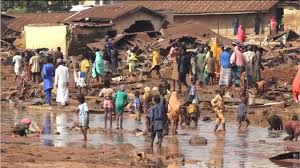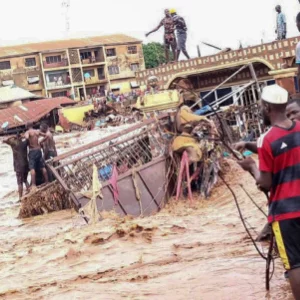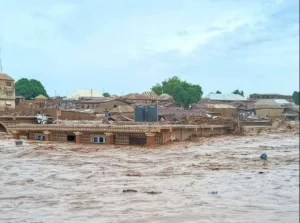
News
Deadly Floods in Niger State: A Call for Urgent Action Amid Rising Climate Concerns
Deadly floods in Mokwa, Niger State, kill over 150, displace thousands. NEMA responds as debates on climate change and infrastructure failures intensify.
On May 31, 2025, Niger State, Nigeria, was struck by a catastrophic flooding event in Mokwa, claiming at least 151 lives and displacing over 3,000 people, according to local reports. Torrential rainfall battered the region, submerging homes, destroying infrastructure, and leaving many residents missing.
The National Emergency Management Agency (NEMA) has intensified search and rescue operations while delivering essential relief items such as food, blankets, and mosquito nets to affected communities. President Bola Tinubu has directed NEMA to prioritize emergency response efforts to mitigate the crisis, which has been described as an “unprecedented flood” by local authorities.

The flooding, triggered by intense rainfall in the early hours of May 29, 2025, has wreaked havoc in Mokwa, a market town along the Niger River. According to Ibrahim Audu Husseini, a spokesman for the Niger State Emergency Management Agency (SEMA), the deluge washed away dozens of homes, with bodies still being recovered downstream in the Niger River.
The disaster has displaced thousands, with over 50 homes reported destroyed and critical infrastructure, including roads and schools, severely impacted. Local officials warn that the death toll may rise as rescue operations continue.
This tragedy has sparked widespread discussions on X and across Nigeria about the underlying causes and the government’s response to recurring floods. Many users on X have criticized the lack of proactive measures, pointing to systemic issues such as inadequate drainage systems, unregulated urban development, and poor maintenance of water infrastructure like dams.

For instance, posts on X highlight the failure to clear drainage channels and the construction of homes on floodplains, which exacerbate flooding during Nigeria’s rainy season. Others have linked the disaster to climate change, noting that extreme weather patterns are becoming more frequent and intense, as warned by scientists.
Nigeria’s rainy season, which typically spans six months, often brings devastating floods due to heavy rainfall, poor infrastructure, and human-induced factors. The Nigerian Meteorological Agency (NiMet) had issued warnings of potential flash floods in 15 states, including Niger State, prior to the event.
Despite these forecasts, the scale of the disaster has exposed gaps in preparedness and response. Experts argue that Nigeria’s flooding challenges are not solely due to climate change but also stem from human activities, such as building on waterways and improper waste management, which clogs drainage systems. For example, a 2024 report by Premium Times noted that blocked drainages and silted river pathways significantly impede water flow during heavy rains, a problem evident in Mokwa’s flooding.
The federal government’s response, led by NEMA, includes coordinating with local authorities and international partners to provide immediate relief and support long-term recovery. In Jigawa, another flood-hit state, public buildings have been converted into shelters, and essential supplies like malaria diagnostic kits and food rations have been distributed.

However, the recurring nature of these floods has fueled calls for sustainable solutions. Environmental experts and community advocates on X emphasize the need for resilient infrastructure, such as modern drainage systems and buffer dams, alongside comprehensive flood risk management strategies.
The absence of a national flood management policy, as noted in a 2021 ReliefWeb report, remains a critical gap in Nigeria’s disaster preparedness framework.
Public sentiment on X reflects frustration and urgency. One user described the Mokwa tragedy as a failure of governance, stating, “The Nigerian state has numerous chances to rectify these problems, but all it does is fail its citizens.” Others advocate for community-based early warning systems and climate adaptation measures to reduce future risks.
The floods have also raised concerns about food security, as thousands of hectares of farmland have been inundated, threatening livelihoods and exacerbating Nigeria’s ongoing economic challenges.
As rescue efforts continue, the Mokwa flooding underscores the urgent need for Nigeria to address both immediate humanitarian needs and long-term systemic issues.
Investments in climate-resilient infrastructure, transparent use of ecological funds, and stronger coordination between government agencies are critical to preventing future tragedies. With the rainy season just beginning, the nation faces a pressing challenge to protect vulnerable communities from the growing threat of climate-driven disasters.




